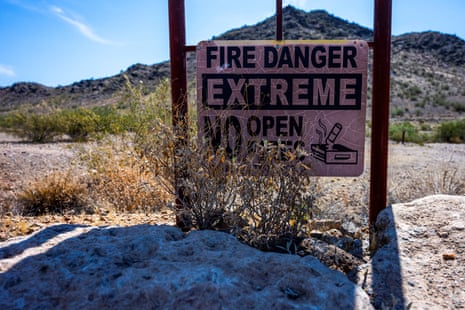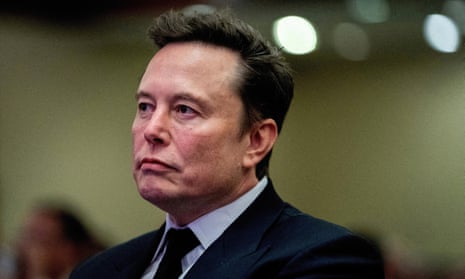Deaths predicted amid the chaos of Elon Musk’s shutdown of USAid
Deaths predicted amid the chaos of Elon Musk’s shutdown of USAid
Share:
The impact of the billionaire’s declaration has been swift and brutal, with food and crucial drugs abandoned in warehouses, vital programmes closed and workers laid off. Critical supplies of life-saving medicines have been blocked and children left without food and battling malnutrition as multiple effects were reported across the globe after Elon Musk resolved to shut down the US government’s pre-eminent international aid agency.
![[People stand outside a building which has US Agency for International Development written above the doorway. They are holding placards which read ‘Save USAid Save Lives’ and USAid Must Be Saved’]](https://i.guim.co.uk/img/media/5d304d074da45cfac1d12bdf5af0c4fca609df10/0_0_7295_5464/master/7295.jpg?width=445&dpr=1&s=none&crop=none)
Chaotic scenes were seen in scores of countries as aid organisations warned of the risk of escalating disease and famine along with disastrous repercussions in areas such as family planning and girls’ education, after President Donald Trump’s decision to freeze funding to USAid. In 2023, the agency managed more than $40bn (£32bn). Countless aid organisations have already been forced to close down or lay off staff.
![[Dozens of people and small children sit on beds in bays in a large medical ward.]](https://i.guim.co.uk/img/media/f62c2ebb9890536d84d9630c04147e66df03272a/0_0_6016_4016/master/6016.jpg?width=445&dpr=1&s=none&crop=none)
Analysis confirms that several thousand women and girls are likely to die from complications during pregnancy and childbirth as a direct result of Trump’s order to freeze aid to the agency for 90 days. Trump has tasked the billionaire Musk – who has falsely accused USAid of being a “criminal” organisation – with scaling down the US government’s lead agency for humanitarian assistance. The impact on the global aid sector has been profound and immediate. US foreign aid accounts for four out of every $10 spent globally on humanitarian aid.
![[A huddle of people stand amid rows of crops.]](https://i.guim.co.uk/img/media/dfc373cef7f2e2a346560c5336cb80d736c00fa8/0_0_4032_3024/master/4032.jpg?width=445&dpr=1&s=none&crop=none)
One former senior USAid official described Musk’s crackdown as an “extinction-level event” for the international humanitarian sector. The initial repercussions include the abandonment in warehouses of supplies of crucial drugs in Sudan, the site of what is currently the world’s worst humanitarian crisis, as well as in the Democratic Republic of the Congo (DRC), where recent fighting in the east has further destabilised the fragile region.
![[A farmer shovels coca beans in a greenhouse for drying]](https://i.guim.co.uk/img/media/d65044db5e4b6464f9d5962e882791adc8fecf3a/0_0_1800_1200/master/1800.jpg?width=445&dpr=1&s=none&crop=none)
Across Africa, hundreds of thousands of children who rely on school meals have been left without sustenance after food was left to rot in the wake of Musk’s declaration that he wanted the US aid agency to “die”. “Partners on the ground [are saying] that in DRC and Sudan, medical supplies are stuck in warehouses,” said a spokesperson for a leading international aid organisation. Like many aid workers the Guardian interviewed, the spokesperson requested anonymity, amid claims that officials from the Trump administration have put pressure on those in the humanitarian sector not to speak out. Many were also reluctant to talk on the record over fears of future funding,.
![[A poster showing a worried woman at the edge of a road.]](https://i.guim.co.uk/img/media/727e17869842c99b21c0802fb1e23445bea3dffb/0_0_5184_3456/master/5184.jpg?width=445&dpr=1&s=none&crop=none)
Among the projects already forced to close is a girls’ education project in Nepal, raising the risk of a rise in child marriage and trafficking. “All payments are frozen for these projects. There’s a lot of misinformation. Organisations are having to make decisions in a vacuum,” said one humanitarian official. In Bangladesh, the International Centre for Diarrhoeal Disease Research, which coordinates pioneering research into one of the most prolific killers of children, has laid off some of the world’s most respected scientists working on malaria programmes.
In Africa, malaria-control programmes in Uganda have been forced to adopt equally draconian measures with reports that dozens of vital projects for frontline care have been closed. Farther south in Malawi, where many rely on donor-funded programmes for survival, fears are mounting that the aid freeze could redraw the country’s entire economy. Within farming communities – the backbone of Malawi’s economy – Mike Dansa, chair of the Nsanje Civil Society Organisation, warned it could upend agricultural aid programmes that support smallholders with improved seeds, irrigation and climate-resilience projects, threatening food security in a country reeling from extreme weather events.
In Johannesburg, projects that have relied for more than 20 years on funding from the US HIV/Aids response programme, known as Pepfar, have had to lock their doors. Dawie Nel, director of a Johannesburg LGBTQ+ clinic called Out, said his organisation, which looks after 6,000 clients, had suspended its treatment. “The US is a totally unreliable partner,” he said. Across the Atlantic, similar scenes of chaos were playing out. In Colombia, which has been plagued by six decades of internal conflict and drug-related violence, large numbers of organisations rely on USAid funding.
Programmes providing emergency relief to families fleeing violence between armed groups and encouraging farmers to swap coca – the base ingredient of cocaine – for legal alternatives have ceased operating. Colombia’s former president and Nobel peace prize laureate, Juan Manuel Santos, told the Guardian: “I have seen the massive benefit these programmes funded by USAid have generated for people across the country. To cut it, suddenly, is going to have a terrible humanitarian effect.”.






















